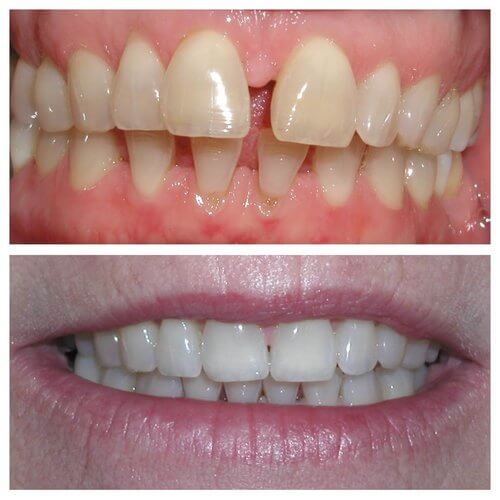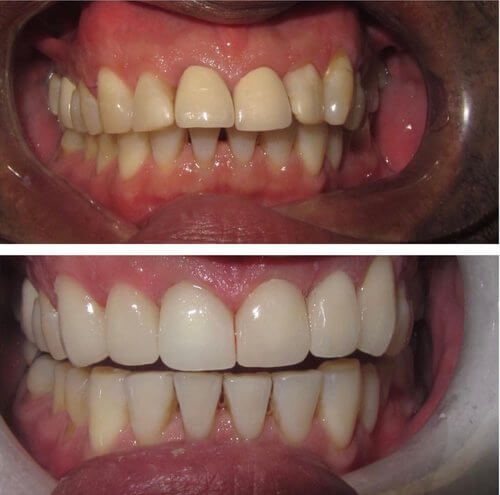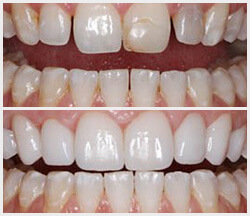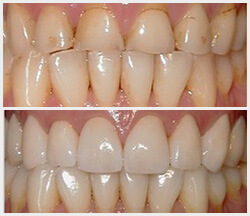Repair Your Damaged or Missing Teeth
Do you avoid certain foods or find dining out embarrassing because you struggle to chew with missing teeth or ill-fitting dentures? Dental implants restore bite force and chewing capacity for worry-free eating of your favorite foods. Enjoy steak, apples, and corn on the cob again. If you think dental implants may be the answer to your dental problems, call our Staten Island office at (718) 948-5111 to set up your appointment.
What Are Subperiosteal Dental Implants?
Subperiosteal dental implants are a type of tooth restoration used to replace missing teeth in patients who have an insufficient bone density in the jaw. Instead of being placed directly into the jawbone, subperiosteal implants are placed under the gum line, on top of the bone.
A subperiosteal implant consists of a metal frame that we’ll custom-fit to the patient’s jaw. The frame is anchored to the jawbone using small posts, which protrude through the gum line to support the replacement teeth. These replacement teeth can be fixed or removable, depending on the patient’s needs or preferences.
Subperiosteal Implant Advantages
There are several advantages of subperiosteal dental implants, including:
- No Bone Grafting Required: Subperiosteal dental implants don’t require a bone grafting procedure before placement, which makes the process quicker and less invasive
- Suitable for Patients with Insufficient Jawbone Density: Subperiosteal dental implants work well for patients with insufficient jawbone density who may not be candidates for traditional endosteal implants.
- Stable and Durable: They’re anchored to the jawbone using small posts, which provide a stable and durable foundation for the replacement teeth.
- Customizable: These implants can be custom-fitted to the patient’s jaw, ensuring a comfortable and natural-looking fit.
- Versatile: Subperiosteal dental implants can be used to replace one or multiple missing teeth or to support a full arch restoration or full mouth rehabilitation.
- Easy to Clean and Maintain: They can be cleaned just like natural teeth, making it easy for patients to maintain good oral hygiene.
Why Subperiosteal Implants Are Rarely Used Today
Despite the advantages of subperiosteal dental implants, they’re rarely used today compared to traditional endosteal dental implants. The main reason is the advancements in bone grafting techniques, which have made it possible for many patients with insufficient jawbone density to undergo a bone grafting procedure and receive a traditional endosteal implant.
Another reason is that subperiosteal dental implants require a metal frame to be anchored to the jawbone, which can sometimes cause discomfort and make it difficult to clean the implant effectively. This can increase the risk of infection and may also lead to implant failure over time.
In addition, subperiosteal dental implants are generally more complex and time-consuming to place compared to traditional endosteal implants and require a higher level of expertise and skill from the dentist. As a result, not all dentists are trained to place subperiosteal dental implants, and patients may need to travel to a specialist center to receive this type of implant.
In recent years, advancements in dental implant technology have resulted in the development of alternative implant systems that are less invasive and provide similar benefits to subperiosteal dental implants. These new implant systems are now widely available and are often a preferred option for patients who require dental implant treatment.
Frequently Asked Questions
How long do subperiosteal dental implants last?
Subperiosteal dental implants can last as long as a lifetime with proper care. They’re typically made of durable materials such as titanium, which is known for its biocompatibility and long-term stability.
Are subperiosteal dental implants painful?
The procedure to place subperiosteal dental implants is usually done under local anesthesia or another form of dental sedation to minimize discomfort. Some patients may experience mild pain or swelling for a few days after the procedure, but you can manage this with over-the-counter pain medications and cold compresses.
Do subperiosteal dental implants require special care?
Subperiosteal dental implants require the same care and maintenance as natural teeth, including regular brushing, flossing, and visits to your dentist twice a year for checkups. It’s important to maintain good oral hygiene to prevent any infection from occurring and ensure the longevity of the implant.
Are subperiosteal dental implants removable?
Subperiosteal dental implants can be fixed or removable, depending on the patient’s needs and preferences. However, you should consult with your dentist to discuss which option is best for you.
Learn More About Your Dental Implant Options
If you’re ready to replace your missing teeth, but you’ve been told dental implants aren’t suitable for you due to insufficient jawbone density, consult your dentist. Subperiosteal dental implants may be the best treatment for you.
If you’re in the Staten Island area and are seeking implant treatment, get in touch with one of our dentists today.



Insurance
We accept many insurances. Please contact one of our Insurance Coordinators to discuss your dental coverage plan.
(718) 948 5111
appointments@sidental.com
Open 7 days a week
Reviews
The dentists are absolutely excellent…
“I have been going here for years. The dentists are absolutely excellent and they always have an appointment available that fits into a busy schedule. I also completed invisilgn and my teeth are perfectly straight now. They also practice preventive medicine and just went in for my 6 month cleaning. Every time feel like I have a new set of choppers and best yet the check up noted no cavities!.”
— J.R
Pleasant visit
“As usual, it was a pleasant visit thanks to Dr. Nasso and her great staff..”
— C.M.
Always treated with courtesy and respect.
“Always treated with courtesy and respect. All of my questions were answered regarding upcoming treatments..”
— J.C.
Smile Profile




Put your best face forward.
Create a positive change to your teeth and your smile.
